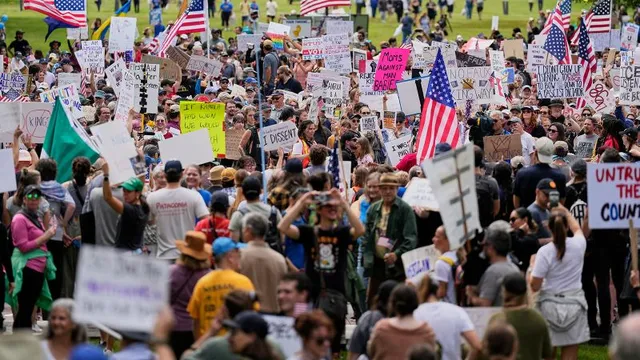
Teenager faces federal charges for brandishing firearm at Nashville protest
2025-06-24 00:00- Elijah Millar confronted protesters at the 'No Kings' event, allegedly brandishing a firearm.
- He had been previously prohibited from possessing firearms due to a 2023 conservatorship order.
- If convicted, he faces up to 15 years in federal prison and a significant fine.
Express your sentiment!
Insights
In June 2025, during a protest event known as 'No Kings', Elijah Millar, a 19-year-old from Murfreesboro, Tennessee, was apprehended for allegedly brandishing a firearm. The protest occurred near Bicentennial Capitol Mall State Park in Nashville, where Millar, dressed in all-black clothing and a mask, confronted demonstrators, which led to his arrest by the Metropolitan Nashville Police Department. Witnesses reported that Millar had spat at protesters and yelled, causing significant fear among the crowd. He was charged with unlawful possession of a firearm as he had been previously restricted from owning firearms due to a conservatorship order that identified him as at risk of substantial harm to himself and others. Three days after his initial release on bond, Millar was arrested again, this time for carrying a second loaded 9mm firearm in his waistband. Prosecutors raised concerns about his social media behavior indicating a potential desire to commit acts of mass violence. This incident came amid a nationwide series of 'No Kings' protests aimed to challenge Trump administration policies, which had garnered attention across more than 2,000 events throughout America. While most protests were peaceful, tensions escalated during events in some locations, notably with incidents of violence occurring elsewhere on the same day. Authorities emphasized that the right to mindful, peaceful protest is protected under the First Amendment and should not be undermined by armed individuals. Acting US Attorney Robert E. McGuire stated that the legal pursuit of offenses related to firearms is intended to safeguard public safety against possible violence. If convicted, Millar faces up to 15 years in federal prison and a fine of $250,000. The situation has drawn attention from federal investigations, including the FBI's Nashville Field Office, and it reflects the broader context of ongoing societal and political tensions surrounding protests across the country. The legal implications of Millar's actions highlight not only individual responsibility but also the societal ramifications that derive from gun violence in protest situations and the precarious balance between freedom of speech and public safety.
Contexts
The nationwide protests under the banner "No Kings" have had significant impacts across various segments of society, from political discourse to social dynamics. These protests, primarily aimed at rejecting authoritarian leadership and demanding greater democracy and accountability, have galvanized a diverse array of participants, including youth groups, civil rights organizations, and marginalized communities. As a result, the movement has not only drawn attention to issues of governance and representation but has also fostered a sense of solidarity among disparate social groups united against perceived injustices. In many cities, the protests have been marked by peaceful demonstrations, educational campaigns, and community organizing efforts, highlighting the democratic ideals of grassroots activism. Interestingly, the impact of the "No Kings" protests has also spilled into mainstream media, prompting discussions on government policy and the role of citizens in a democracy. Media coverage has increased public awareness of issues likened to corruption, nepotism, and lack of transparency within the government. Protesters have utilized social media platforms effectively to share their messages and mobilize support, making the movement resonate beyond physical locations and into the virtual world, which has been vital in shaping public opinion. Consequently, various political figures and institutions are being compelled to respond to the protests, whether by modifying their approaches or directly addressing the demands raised by protesters. Furthermore, the protests have catalyzed legislative debates around reform initiatives intended to enhance democratic practices and increase citizen engagement. Legislative proposals have surfaced that focus on electoral reform, lobbying regulations, and improving public services, echoing the core messages of the movement. In local governments, there have been calls for more inclusive decision-making processes, aiming to address grievances that have long been ignored by existing authorities. This burgeoning discourse shows how the protests have managed to extend their influence into policy arenas, illustrating how collective social movements can lead to tangible changes in governance. The long-term implications of the "No Kings" protests remain to be seen; however, their current contributions to raising political consciousness and invigorating civic participation are undeniable. As they continue to unfold, it is essential for observers to note how such movements can shape the trajectory of democracy in the country. By fostering a culture of questioning authority and asserting the right to equitable representation, these protests not only challenge existing power structures but also lay the groundwork for a more engaged and participatory citizenry. It is a powerful reminder of the capacity of ordinary people to drive significant societal change when they come together under a common cause.